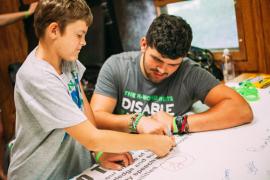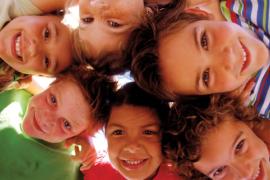In the days and weeks leading up to opening day, I can hardly contain my excitement about being reunited with my favorite people on the planet. I can’t wait to see how much the campers have grown and matured and to hear about the experiences the staff had over the year. I look forward to the big annual events like the final camp show, the weekly traditions like colors and vespers, and even the ever-present bugle calls.
As a veteran camper, counselor, and administrator, I feel extremely protective of our camp’s traditions. I believe that I have a significant responsibility to ensure that old camp songs continue to be sung, that the tenor of vespers is reflective and offers an opportunity for introspection, and that certain camp legends live on. But over the past decade or so, I have noticed a shift in the tone of certain events and traditions that has given me pause on a number of occasions. I grapple with whether this is a battle worth fighting or whether these changes might just be for the better.
The authors of A Paradise for Boys and Girls: Children’s Camps in the Adirondacks wrote, “Camp traditions have been vital to the . . . camp experience, but they are also constantly being invented, recycled, revisited, and sometimes let go” (Bond, Brumberg, & Paris, 2006). Well-established traditions are an important part of creating a camp community. Having anticipated events such as color wars, mid-season ceremonies, and talent shows allows campers and staff to feel they are an important part of something special. Participating in something that the earliest campers did and that campers across the country do gives campers a sense of connection between past and present, something which is often lost in today’s society.
One tradition that looks significantly different today than it did even in the 1980s is our camp’s colors ceremony. As a camper, I was aware that this weekly event should be solemn and serious in tone. We made sure to wear our whitest of shirts and navy shorts, and when we marched to the flagpole, we did so with great respect. Today, I stand in the reviewing line at our Sunday colors ceremony as each unit marches in cheering and chanting loudly, sometimes in thematic head wear or costumes. I must admit, I feel a sense of unrest as I watch this flashy display so vastly different than what I recall colors to be. But the campers love the opportunity to make up a chant each week and to come up with a clever phrase to say during the unit roll call (also a new addition to the ceremony, made in an effort to stem the tide of outbursts made after ribbons were awarded to units being recognized for spirit or service). So I have to ask myself, “Is this change for the better?” It certainly promotes a sense of unity and pride among the campers, and isn’t that what camp is all about?
Many families choose to send their children to camp to escape the real world in which they are bombarded with pressure at school, social media, technology, and a 24/7 news cycle that often showcases all that’s wrong in the world. Life in the “camp bubble” is often devoid of all that. Bug juice, sandy feet, s’mores, and campfires — these are all part of a reassuring notion that certain aspects of childhood are, in fact, being preserved in spite of the relentless advance of technology.
I think it is crucial to safeguard camp traditions to ensure campers come away from a summer at camp knowing they are part of a community with a rich past. I hope that when my daughter and her cousins — all of whom are the children of parents who met at camp — are old enough to participate in these rites and rituals that they will understand they are part of a century-long legacy. And I hope they feel a sense of responsibility to keep it alive — in whatever form is most relevant for the time.
Photo courtesy of Camp Ketcha, Scarborough, Maine
Reference
Bond, H. E., Brumberg, J. J., & Paris, L. (2006). A paradise for boys and girls: Children’s camps in the Adirondacks. Syracuse, NY: Syracuse University Press.
Daniella K. Garran has spent more than 30 summers at Cape Cod Sea Camps where she is an assistant director. During the off season she is a middle school social studies teacher. She is also the author of Hello Mother, Hello Father: Celebrating Summer Camp.


